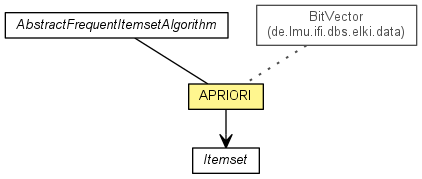

@Title(value="APRIORI: Algorithm for Mining Association Rules") @Description(value="Searches for frequent itemsets") @Reference(authors="R. Agrawal, R. Srikant", title="Fast Algorithms for Mining Association Rules", booktitle="Proc. 20th Int. Conf. on Very Large Data Bases (VLDB \'94), Santiago de Chile, Chile 1994", url="http://www.vldb.org/conf/1994/P487.PDF") public class APRIORI extends AbstractFrequentItemsetAlgorithm
R. Agrawal, R. Srikant:
Fast Algorithms for Mining Association Rules
In Proc. 20th Int. Conf. on Very Large Data Bases (VLDB '94), Santiago de
Chile, Chile 1994.
| Modifier and Type | Class and Description |
|---|---|
static class |
APRIORI.Parameterizer
Parameterization class.
|
| Modifier and Type | Field and Description |
|---|---|
private static Logging |
LOG
The logger for this class.
|
private String |
STAT
Statistics logging prefix.
|
maxlength, minlength| Constructor and Description |
|---|
APRIORI(double minfreq)
Constructor with minimum frequency.
|
APRIORI(double minfreq,
int minlength,
int maxlength)
Constructor with minimum frequency.
|
| Modifier and Type | Method and Description |
|---|---|
protected List<Itemset> |
aprioriGenerate(List<? extends Itemset> supported,
int length,
int dim)
Prunes a given set of candidates to keep only those BitSets where all
subsets of bits flipping one bit are frequent already.
|
private int |
binarySearch(List<SparseItemset> candidates,
SparseItemset scratch,
int begin,
int end)
Binary-search for the next-larger element.
|
protected List<OneItemset> |
buildFrequentOneItemsets(Relation<? extends SparseFeatureVector<?>> relation,
int dim,
int needed)
Build the 1-itemsets.
|
protected List<SparseItemset> |
buildFrequentTwoItemsets(List<OneItemset> oneitems,
Relation<BitVector> relation,
int dim,
int needed,
DBIDs ids,
ArrayModifiableDBIDs survivors)
Build the 2-itemsets.
|
private StringBuilder |
debugDumpCandidates(StringBuilder msg,
List<? extends Itemset> candidates,
VectorFieldTypeInformation<BitVector> meta)
Debug method: output all itemsets.
|
protected List<? extends Itemset> |
frequentItemsets(List<? extends Itemset> candidates,
Relation<BitVector> relation,
int needed,
DBIDs ids,
ArrayModifiableDBIDs survivors,
int length)
Returns the frequent BitSets out of the given BitSets with respect to the
given database.
|
protected List<SparseItemset> |
frequentItemsetsSparse(List<SparseItemset> candidates,
Relation<BitVector> relation,
int needed,
DBIDs ids,
ArrayModifiableDBIDs survivors,
int length)
Returns the frequent BitSets out of the given BitSets with respect to the
given database.
|
TypeInformation[] |
getInputTypeRestriction()
Get the input type restriction used for negotiating the data query.
|
protected Logging |
getLogger()
Get the (STATIC) logger for this class.
|
private boolean |
initializeSearchItemset(BitVector bv,
int[] scratchi,
int[] iters)
Initialize the scratch itemset.
|
private boolean |
nextSearchItemset(BitVector bv,
int[] scratchi,
int[] iters)
Advance scratch itemset to the next.
|
FrequentItemsetsResult |
run(Relation<BitVector> relation)
Performs the APRIORI algorithm on the given database.
|
getMinimumSupportmakeParameterDistanceFunction, runprivate static final Logging LOG
private final String STAT
public APRIORI(double minfreq,
int minlength,
int maxlength)
minfreq - Minimum frequencyminlength - Minimum lengthmaxlength - Maximum lengthpublic APRIORI(double minfreq)
minfreq - Minimum frequencypublic FrequentItemsetsResult run(Relation<BitVector> relation)
relation - the Relation to processprotected List<OneItemset> buildFrequentOneItemsets(Relation<? extends SparseFeatureVector<?>> relation, int dim, int needed)
relation - Data relationdim - Maximum dimensionalityneeded - Minimum support neededprotected List<SparseItemset> buildFrequentTwoItemsets(List<OneItemset> oneitems, Relation<BitVector> relation, int dim, int needed, DBIDs ids, ArrayModifiableDBIDs survivors)
oneitems - Frequent 1-itemsetsrelation - Data relationdim - Maximum dimensionalityneeded - Minimum support neededids - Objects to processsurvivors - Output: objects that had at least two 1-frequent items.protected List<Itemset> aprioriGenerate(List<? extends Itemset> supported, int length, int dim)
supported - Support maplength - Itemset lengthdim - Dimensionalityprotected List<? extends Itemset> frequentItemsets(List<? extends Itemset> candidates, Relation<BitVector> relation, int needed, DBIDs ids, ArrayModifiableDBIDs survivors, int length)
candidates - the candidates to be evaluatedrelation - the database to evaluate the candidates onneeded - Minimum support neededids - Objects to processsurvivors - Output: objects that had at least two 1-frequent items.length - Itemset lengthprotected List<SparseItemset> frequentItemsetsSparse(List<SparseItemset> candidates, Relation<BitVector> relation, int needed, DBIDs ids, ArrayModifiableDBIDs survivors, int length)
candidates - the candidates to be evaluatedrelation - the database to evaluate the candidates onneeded - Minimum support neededids - Objects to processsurvivors - Output: objects that had at least two 1-frequent items.length - Itemset lengthprivate boolean initializeSearchItemset(BitVector bv, int[] scratchi, int[] iters)
bv - Bit vector data sourcescratchi - Scratch itemsetiters - Iterator arraytrue if the itemset had minimum lengthprivate boolean nextSearchItemset(BitVector bv, int[] scratchi, int[] iters)
bv - Bit vector data sourcescratchi - Scratch itemsetiters - Iterator arraytrue if the itemset had minimum lengthprivate int binarySearch(List<SparseItemset> candidates, SparseItemset scratch, int begin, int end)
candidates - Candidates to search forscratch - Scratch spacebegin - Search interval beginend - Search interval endprivate StringBuilder debugDumpCandidates(StringBuilder msg, List<? extends Itemset> candidates, VectorFieldTypeInformation<BitVector> meta)
msg - Output buffercandidates - Itemsets to dumpmeta - Metadata for item labelspublic TypeInformation[] getInputTypeRestriction()
AbstractAlgorithmgetInputTypeRestriction in interface AlgorithmgetInputTypeRestriction in class AbstractAlgorithm<FrequentItemsetsResult>protected Logging getLogger()
AbstractAlgorithmgetLogger in class AbstractAlgorithm<FrequentItemsetsResult>Copyright © 2015 ELKI Development Team, Lehr- und Forschungseinheit für Datenbanksysteme, Ludwig-Maximilians-Universität München. License information.